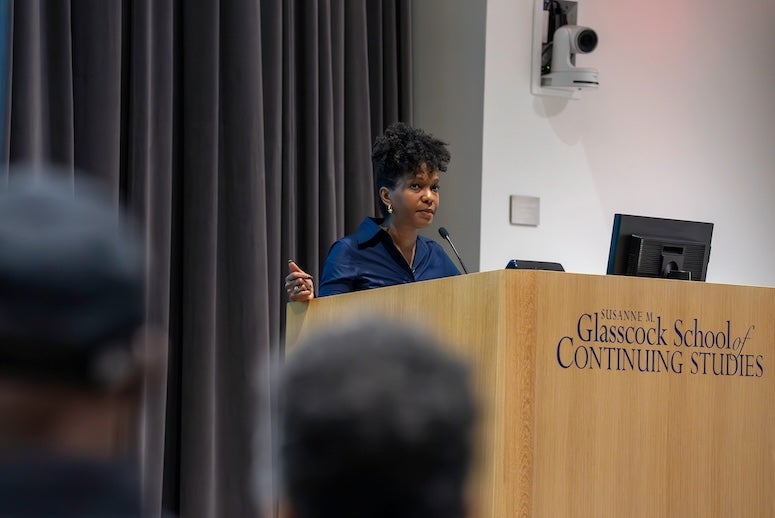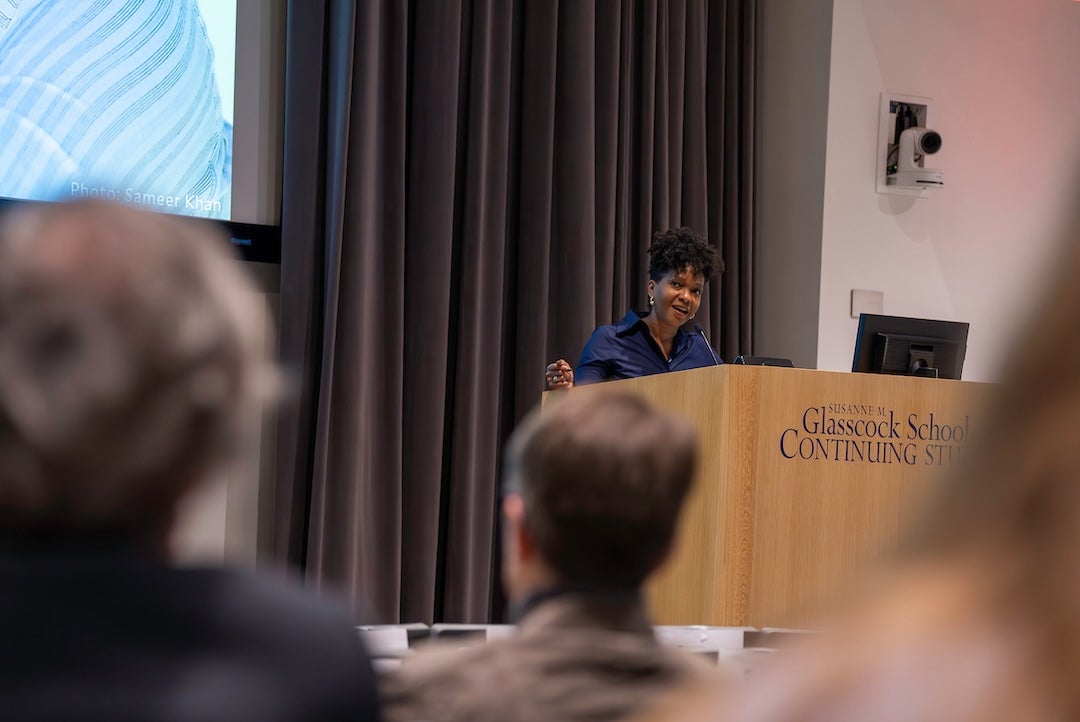
“What to the slave is the law?”
Imani Perry opened with that thought-provoking question during this year’s Campbell Lectures in which the 2023 MacArthur Fellow, National Book Award winner and Harvard University professor discussed several topics regarding race, law, gender, culture and more.
Perry led two consecutive nights of engaging and wide-ranging discussions Nov. 15-16 at Rice University as the latest speaker in the School of Humanities’ Campbell Lecture Series. The lectures are made possible by the Campbell Foundation to further the study of key issues in the humanities, including literature and the arts, with a 20-year annual series of public lectures.
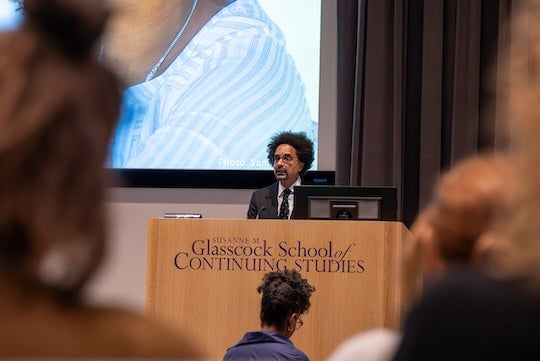
“Dr. Imani Perry imbibed from an early age a strong instinct for justice and progressive change,” said Alexander Byrd, vice provost for diversity, equity and inclusion and associate professor of history at Rice, who introduced Perry during the first lecture. “Perry’s work reflects the beautiful and deeply complex history of black thought, art and imagination. It is also informed by her background as a legal historian and her understanding of the racial inequality embedded in American law.”
Perry’s initial question, “What to the slave is the law?” references the famous speech of 19th century abolitionist Frederick Douglass titled “What to the slave is the Fourth of July?” She described Douglass’ 1852 lecture as a “foundational moment for jurisprudential thought and tradition in black thought.”
Through the prism of slavery, Perry explored the meaning of law in 19th century United States for those required to follow a set of rules that discriminated against them.
“We go back to the 19th century in the antebellum period and the law, and we usually talk about it in a kind of enshrined way,” Perry said during her first lecture, titled “For Oneself and One’s Own: Law, Citizenship and African American History.” “But we have to think about for those who were held captive, the law was what enabled them to be ripped from family, to be bought and sold, to have no autonomy over their bodies or their labor and to be forced to work without compensation. These were all legal matters.
“They were both outside and inside the law at once — inside the law in the sense of having duties to comply with according to their status, but to be outside the status of being someone who had rights.”
Perry referenced the 1829 decision of the North Carolina Supreme Court in the State v. Mann case as an example. The ruling declared that slaves had no rights from their masters.
The defendant in the case was John Mann, a North Carolinian who had been renting a slave named Lydia. When she committed what he deemed an offense, Mann whipped her. During the whipping, Lydia attempted to escape, so Mann shot and gravely wounded her.
Authorities deemed his response to her escape attempt disproportionate and charged him with assault and battery. In the criminal trial, the jury ruled against him. He appealed, claiming that assault on a slave by their master could not be indictable since a slave was the master’s property.
“This is a famous case because it’s often cited as evidence of the brutality of slavery, and it became one of those cases that abolitionists organized around,” Perry said. “But what’s really interesting to me about it is to think about the position of liberty as someone who was at the center of a case but had no voice and had no rights and had no recognized agency.”
Perry also spoke about Pauli Murray, an American civil rights activist, advocate, legal scholar, theorist and author. Murray’s work influenced the civil rights movement, specifically Brown v. Board of Education litigation, and expanded legal protection for gender equality.
Perry brought up talking points about Murray’s ambiguities when it came to race and gender, exemplifying what it meant to exist “outside of recognized framework” and how gender and race coincided during the Jim Crow era.
“Murray was someone who believed that beyond the categories of race there should be a protection of the individual before law, whoever they are,” Perry said.
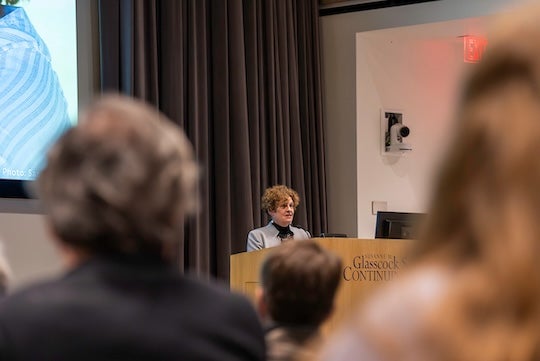
Perry also spoke of philosopher and artist Adrian Piper along similar lines of fitting in outside of the aforementioned framework.
“Piper’s and Murray’s ambiguity and confrontation with the world not only exposed the absurdity and arbitrariness of the color and gender lines, but the layers of vulnerability and the truth of fungibility that they could be categorized differently drew attention to something profound,” Perry said. “Formal categories of protection against racism and sexism and national origin in the law are of course necessary but maybe insufficient. Maybe they suggest that another supplement or analytic is necessary.”
Perry finished her first lecture by discussing the legacy of Angela Davis, a revolutionary Marxist, feminist and political activist. She recounted a scholarly article that Davis wrote in prison called “Reflections on the Black Woman’s Role in the Community of Slaves,” describing Davis’ idea that the existence of slavery created a collateral opportunity to reconsider human relations.
“She essentially says that the absence is due to the fact that they couldn’t create a patriarchal structure, and the domestic situation of slavery actually led to a kind of unintentional equality,” Perry said. “Being on the wrong side of the law, Davis imagined, could lead one to think about a different social order altogether, that there’s possibility in the imagination of the enslaved and in her particular intellect.”
Perry’s second lecture, “On Trial: The Tradition of Black Testimony and Witness,” explored the historical effect that hush harbors had on slavery and African-American culture.
Hush harbors, which began as places where enslaved African-Americans would gather in secret to practice religious traditions in the antebellum period, developed into alternative spaces where people who existed outside of the law could be recognized as thinking persons with intellect, Perry said.
“That disposition to create an alternative space of recognition — to be seen and to see others and to witness others and be engaged in a mutuality that comes through shared testimonies and exchange of ideas — that disposition that began in the context of the hush harbor grew far beyond that space,” she said. “It became a foundation of tradition, and the space later developed into post-emancipation churches, schools, civic associations and the like.”
Perry then transitioned into a conversation about Langston Hughes and his famous poem, “Harlem,” honing in on what the American dream looks like for those discriminated against.
“What happens when the dream is deferred for a critical mass of the population? And when that idea and that ethos keeps getting pushed back?” she said. “Hughes is telling us that the dream itself takes on another form and is no longer a noble dream. It could become something ugly and distorted if the dream in its essence is a dream of exclusion, denial and refusal.”
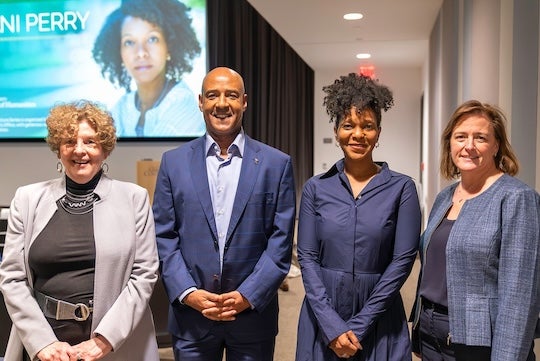
Perry followed by discussing Fannie Lou Hamer, an American voting and women’s rights activist who grew to fame after giving a nationally televised speech in the 1960s depicting her experiences of being brutally beaten at a jailhouse in Winona, Mississippi.
Hamer and several other Black women were arrested in 1963 for sitting in a “whites only” bus station restaurant in Winona after successfully completing a voter registration program in Charleston, South Carolina. Hamer was left with lifelong injuries from a blood clot in her eye, kidney damage and leg damage.
Perry compared Hamer’s experiences to that of the slave Lydia from the State v. Mann case in 1829 who was also injured permanently after the incident.
“We don’t have the testimony from Lydia, but we do have Hamer’s testimony because she traveled across the country telling her story,” Perry said.
In the process of telling her story, Hamer raised more money for the Student Nonviolent Coordinating Committee than any other member of the organization up to that point, Perry said.
Toward the end of the lecture, Perry emphasized the importance of listening and paying attention to the stories and testimonies of past injustices like Hamer’s in order to better recognize injustices occurring in the country today.
“There are lessons that we learn from trying to pay attention where attention wasn’t paid that help us understand how to pay attention better today,” she said. “What we witness as a matter of choice and what we testify to as a matter of ethics and commitments matter a great deal, and they have the potential to travel both far and wide.”

